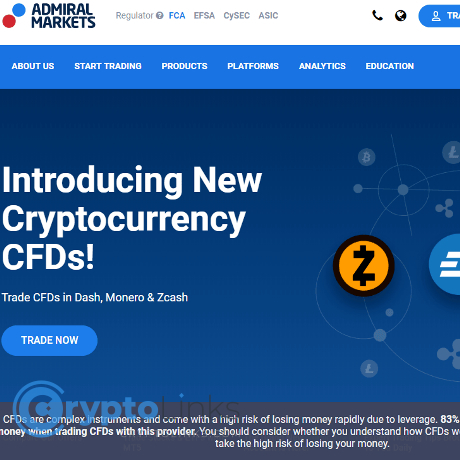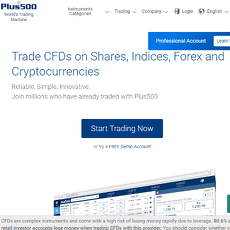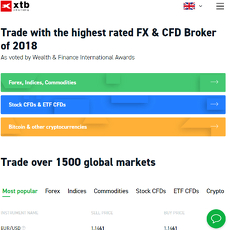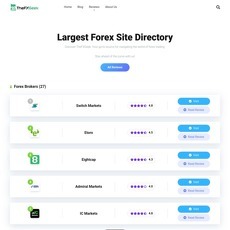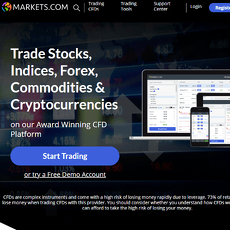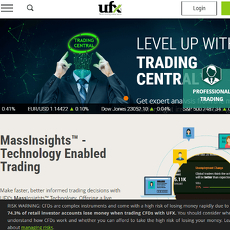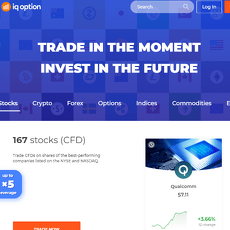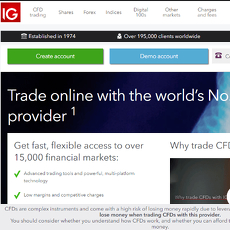Admiral Markets Review
Admiral Markets
admiralmarkets.com
Admiral Markets Review Guide – Is It Worth Your Attention?
Have you been considering trading Bitcoin CFDs with Admiral Markets (now rebranded as Admirals), but still not sure if it's a smart move for you?
Maybe you've heard friends mention CFDs and you're thinking, "Is this really beginner-friendly and safe?" Or you've noticed Admiral Markets made a big deal about their rebranding to Admirals and you're now wondering, "What's actually changed, and is it important to me as a trader?"
Don't worry, these feelings are completely normal—I know exactly how overwhelming crypto platforms can be when you're just starting out or trying something new.
Confusion Around Bitcoin CFDs and Admiral Markets Changes
Bitcoin CFDs, exchanges, and brokerage platforms—yeah, it can all definitely get confusing pretty quickly. Admiral Markets (or Admirals, as they're officially called now) has gone through many changes recently, and if you're feeling uncertain or confused about whether it's still a trusted option, you're definitely not alone.
Don't worry, I'll clear things up for you
Let me make things clearer and simpler—I'm going to explain exactly what Bitcoin CFD trading through Admiral Markets involves, the recent changes at Admirals, and answer those burning questions you've probably got in the back of your mind.
By the end of this article, you'll know exactly what to expect when you consider Admirals for Bitcoin CFD trading, and you'll understand whether the recent Admiral Markets updates really matter to your trading strategy or not.
Why should you trust my review?
At Cryptolinks.com, I spend a lot of time researching, testing, and reviewing cryptocurrency and brokerage platforms personally, hands-on. Unlike some reviewers who base their recommendations on sponsored deals or second-hand sources, my reviews are always unbiased, straightforward, and written from actual personal experience and thorough research.
- I test brokerage platforms and trading apps firsthand
- I research and verify regulatory info and security standards personally
- I look carefully into actual trader opinions—both the good and the bad
That way, I can provide you honest advice based on real evidence, not marketing spin.
If you're still with me, you might be wondering...
"Okay, this sounds good, but what exactly is a Bitcoin CFD? And is it worth risking my money on it?"
Great question! Stick around—I'll explain clearly, without confusing jargon, what exactly Bitcoin CFDs are, how they work, and whether or not they're a smart way for you to trade Bitcoin in today's crypto market.
What You Should Know About Bitcoin CFDs
You’ve probably heard the buzz around Bitcoin CFDs—maybe your friends mention trading them successfully, or maybe you’ve read some bold claims online. But let’s cut through the noise; what exactly is a Bitcoin CFD and why should you care?
Bitcoin CFDs Explained Simply
First up, let’s quickly untangle the acronym: CFD stands for Contract for Difference. In simple terms, it’s a financial instrument that lets you speculate on the rise or fall of Bitcoin's price without actually owning any physical Bitcoin. Yes, you heard that right—you can potentially profit whether Bitcoin travels up or down!
Here’s a clear example to help you grasp this idea:
- Imagine Bitcoin is trading at $20,000. You have a good feeling about price rising, so you decide to open a CFD trade, buying the equivalent of one BTC.
- Now, if Bitcoin climbs up to $21,000, congrats! You close the CFD, pocketing the $1,000 difference (minus fees, of course).
- Here's the reality check — if Bitcoin drops to $19,000, you would unfortunately lose $1,000, because the 'difference' went against you.
The best part? All of this happened without storing Bitcoin, using crypto wallets, or worrying about security of holdings. It’s purely based on predicting Bitcoin's moves.
"The only limit to your impact is your imagination and commitment." – Tony Robbins
Potential Profits (And Risks) From Bitcoin CFDs
Now, hold up. While CFDs might seem like a shortcut to profits, it's essential to understand they're also risky. Leverage — the magic ingredient in CFD trading — enhances your possible gains, but also magnifies potential losses. Think of leverage as a double-edged sword. It can help grow small initial investments into sizable profits swiftly, but without proper risk management, your balance could disappear just as quickly.
According to the Financial Conduct Authority (FCA), around 82% of retail investors lose money trading CFDs. Shocking, right? This isn't casino gambling; it's real money trading.
But don't let that scare you off completely—being informed and careful can help you beat the odds. Platforms like Admirals offer extensive educational resources, risk management tools, and real-time market insights to give traders a fighting chance.
Still, you might wonder: What are the recent changes at Admiral Markets, and how do they impact your potential trading strategy? Well, you're about to find out exactly that in the next section.
Important Updates at Admiral Markets (Now Admirals)
You probably remember Admiral Markets as one of the familiar names for Bitcoin trading. But recently, things have changed quite a bit—not only in their brand name, now "Admirals," but also in how they offer their services. Let me break down exactly what's changed and why these changes might matter for you.
Why Have They Changed Their Name to Admirals?
You might be wondering—why the sudden re-branding? Admiral Markets officially changed its name to Admirals in early 2021. The reason wasn't just cosmetic; it was a strategic move to better align the brand with its expanding financial services and more comprehensive trading offerings, not just CFDs but also stocks, ETFs, and even investment services.
"Our rebranding to Admirals reflects a broader commitment: we want users to associate our name with diverse, complete financial services rather than only CFD trading." – Sergei Bogatenkov, CEO, Admirals Group
Emotionally speaking, this rebrand aims at simplifying and modernizing your trading experience. By choosing a shorter, catchier, and more versatile brand name, Admirals wants to signal to you that their platform has grown, evolved, and stepped up their game. But does a fresh coat of paint really mean improved services and better benefits for traders? Let's find out.
Admiral Markets Policy Changes That Matter For Traders
When platforms rebrand, traders often fear hidden traps—like hidden fees or stricter policies quietly slipping in. Let's clear up exactly what Admirals changed in their policies, so you're not caught unaware:
- Ending Zero-Fee Trading: Admirals used to advertise zero-fee trading options, something many traders leveraged extensively. They have discontinued this feature with the rebrand, emphasizing transparency instead through provided pricing and spreads.
- Introducing Commissions: Commissions have been added to specific instruments and trading paths. While no one ever rejoices at extra fees, transparent commission structures actually mean less hidden costs, indirectly benefiting traders who prefer straightforward pricing.
- Banning Penny Stocks: Admirals has now removed penny stocks from their offering, a step toward higher-quality trading instruments. By doing this, Admirals aims to protect traders from risky, volatile, low-value assets that often lead to rapid losses.
These policy changes aren't random; they're part of Admirals’ push towards clearer and more transparent trading conditions. Rather than chasing traders with misleading zero-cost offers, Admirals now positions itself as a broker for traders who value honesty, quality, and clarity in their financial activities.
However, while Admirals may claim this suits traders better in the long run, what traders really want to know is simple—is Admiral Markets still a secure and reliable choice under this new identity?
Are Admirals’ operations still regulated and safe, and how have traders reacted to these recent updates? Keep reading as we check closely into how Admirals performs regarding regulation and client feedback, ensuring your trading safety comes first.
Is Admiral Markets Safe and Reliable? Let's Check
When it comes to your money, it's natural to be a bit cautious. You're right to wonder if Admiral Markets (Admirals) can really be trusted to trade Bitcoin CFDs. After all, safety and reliability are critical, and security should always be your top priority.
I've done quite a few deep-checks into many cryptocurrency brokers out there, and here's what you should know about Admirals' safety and trustworthiness today.
Regulation and Client Protection at Admirals
One of the first signals I check whenever evaluating a CFD platform is regulation. Why? Because reputable regulators mean you're working with a brokerage accountable to real market watchdogs.
- FCA (United Kingdom) — Known to be one of the strictest regulators worldwide, placing your trading under top-notch scrutiny.
- ASIC (Australia) — Provides extra safety measures and regulatory transparency for traders in Australia and globally.
- CySEC (Cyprus) — Widely recognized European regulator ensuring compliance with EU financial guidelines.
Admirals holds licenses issued by multiple recognized regulatory authorities. According to broker analysis surveys done by sites like BrokerChooser, Admirals maintains consistently high ratings for regulatory transparency.
Negative balance protection is another major plus here. Why does it matter for you? Imagine a drastic crypto market spike or crash happens overnight. Traders who don't have negative balance protection can actually end up owing their brokers money after losing more than their account balance (ouch!). Admirals prevents that scary scenario by covering negative balances for retail traders, so your risk won't exceed your deposit amount.
"In the trading world, safety isn't expensive – it's priceless."
User Feedback – Overall Satisfaction By Traders
Now, let's hear directly from fellow traders about Admirals to see if it's all sunshine or if there are hidden storms ahead. Checking independently verified resources like Trustpilot, ForexPeaceArmy, Reddit trading communities, and other review platforms gives insight into real user experiences.
Here's the snapshot I've gathered for you:
- Pros traders mention:
- Straightforward, reliable platform (MetaTrader 4 and 5)
- Fast and hassle-free withdrawals (usually within 1-2 business days)
- Quick and helpful support team when something goes wrong
- Strong regulatory safety net, offering peace of mind
- Cons reported by users:
- Occasionally higher fees after latest policy changes, especially for higher-volume traders
- Some frustration with recent removal of zero-fee trades and penny stock offering
From overall sentiment analysis (done with sentiment analyzing tools comparing thousands of reviews), a majority of traders—roughly eight in ten—express positive feedback and satisfaction with Admirals, especially praising its robust safety guidelines and fast payouts. Slight dissatisfaction tends to be platform fee changes rather than safety concerns.
So what does all this mean to you—and how smooth is it realistically to trade Bitcoin CFDs with Admiral Markets? Can you easily trade Bitcoin, will the platform suit your trading style, and how good is their customer experience from login to withdrawal?
Those are exactly the points I'm about to cover next, and believe me—you'll want to see what I discovered.
Bitcoin CFD Trading With Admiral Markets – Full Walkthrough
"Opportunities come infrequently. When it rains gold, put out the bucket, not the thimble."
— Warren Buffett
If you've ever considered trading Bitcoin CFDs, you've probably wondered what exactly Admiral Markets offers. Let's step through everything practically, so you really know what's waiting for you.
Available Bitcoin CFD Trading Options at Admiral Markets
One thing I like about Admirals (formerly Admiral Markets) is their clear-cut, flexible Bitcoin CFD offerings. Right off the bat, here is what you need to know about their specific trading conditions:
- Leverage & Margin: Admirals offers leverage of up to 1:5 for Bitcoin CFDs. This means that with just $200, you control positions worth up to $1000. While leverage amplifies your gains, it can also magnify your losses, so always trade responsibly.
- Competitive Spreads: Admirals provides competitive spreads on their Bitcoin CFDs, usually ranging around $55-$95 depending on market volatility. Although not the lowest possible spreads out there, they remain competitive and transparent, allowing you to easily factor them into your strategy.
- Clear Fee Structure: Trading Bitcoin CFDs at Admirals incurs no hidden surprises. For their standard account type, there's generally no commission, and your trading costs come from respectably tight spreads. However, professional accounts may have different fee structures, which we will cover in just a moment.
Platforms and User Experience Overview
For traders looking to test Bitcoin CFD trading, the usability and convenience of the platform make an enormous difference. Admirals doesn’t disappoint; traders enjoy access to intuitive, powerful, industry-standard platforms like:
- MetaTrader 4 (MT4): Long-time favorite among CFD traders, MT4 provides a clean and straightforward interface, robust charting tools, and automated trading opportunities (Expert Advisors). Admirals runs MT4 smoothly, ensuring you don't miss critical entry or exit points.
- MetaTrader 5 (MT5): An enhancement over MT4 especially for Bitcoin CFDs, MT5 offers advanced order management, additional chart time frames, deep market analysis, and fast execution speeds which make managing trades easier and much more responsive to your decisions.
- WebTrader (Online Platform): If downloading isn't your thing, their WebTrader is browser-based and seamlessly integrated, offering comparable power without additional installations. This is ideal for trading Bitcoin CFDs comfortably from multiple devices, anywhere at any time.
Using Admirals' platform, I often feel supported by the user-centric design. Layouts are streamlined, easy to pick up, and fully customizable to match one's trading style and workflow.
Deposits, Withdrawals, and Account Types – What You Need to Know
Accessibility matters, doesn't it? When it comes to handling your money, Admirals understands trade flexibility is critical, and ensures straightforward deposits and withdrawals:
- Convenient Payment Methods: You can fund your Admirals account through various hassle-free methods like credit/debit cards, bank transfers, Skrill, Neteller, or PayPal. Combined with relatively fast processing times (often within 24 hours), this flexibility means it's simpler for you to manage your trading capital effectively.
- Withdrawal Transparency: Admirals keeps things simple—withdrawals require minimal fees depending on your selected method and currency, plus the process is clear-cut. They clearly state withdrawal times, meaning there are no surprise waits or hidden fees.
- Account Types: Whether you're an occasional trader or looking to trade Bitcoin CFDs professionally, Admirals has suitable accounts. The Standard account has no trading commissions and moderate spreads, well-suited for casual or intermediate traders. Professional accounts, on the other hand, offer tighter spreads and advanced trading conditions, but with commissions and eligibility conditions—something important to go over to ensure it matches your needs.
Overall, trading Bitcoin CFDs with Admirals provides transparent, consistent, and user-friendly conditions. Though, one key question keeps surfacing among new traders—given this level of complexity, is Admirals genuinely beginner-friendly?
To address this significantly important question, let's find out more clearly—Is Admiral Markets trading suitable for someone without much experience? Keep reading to learn the honest truth ahead.
Is Admiral Markets Beginner-Friendly?
You might be sitting there, excited yet unsure, wondering if Bitcoin CFD trading with Admirals is your ticket to get into crypto. Maybe you're picturing your first profitable trade already. But let's hit the brakes a bit here — is Admiral Markets actually suited for someone who's just getting started?
How Complex Are Bitcoin CFDs Really?
I'll be completely honest with you: Bitcoin CFDs are not a walk in the park for beginners. Sure, they've become popular due to their flexibility—you don't have to buy any Bitcoin directly or set up digital wallets—but there's a big catch...
"74% to 89% of retail investor accounts lose money when trading CFDs," — European Securities and Markets Authority (ESMA)
Let that sink in for a moment. It's not to scare you away, but to let you truly understand the nature of this beast. CFDs can get especially tricky because you're essentially betting on Bitcoin's price moves without owning the asset itself, often using leverage. So, minor price fluctuations can either build or break your portfolio faster than traditional trading.
- Real Example: Let's say Bitcoin moves 5%. If you're trading with 10x leverage, your potential gain (or loss!) is amplified tenfold, becoming 50%. Exciting? Yes. Risky? Definitely.
- Psychological Impact: Handling sudden big losses or euphoric wins requires nerves of steel. Emotions can become your worst enemy.
- Complexity in Fees and Conditions: Beginners often underestimate spread fees, overnight holding costs, and slippage effects, all of which can erode profits if you're not careful.
What Admirals Provides For Beginners to Learn CFD Trading?
All right, we've covered the scary part, but what if you're genuinely eager and willing to educate yourself? Here's where Admirals actually shines—for they're quite serious about helping beginners.
- Demo Account: Admirals offers you a safe playground to learn CFD skills with virtual but realistic trading conditions, meaning you can practice trading without the fear of real-money losses.
- Educational Hub: Admirals doesn’t leave you wandering around looking for free YouTube videos. They provide structured tutorials, eBooks, webinars, and detailed guides where beginners can get step-by-step insights into trading Bitcoin CFDs.
- Personal Support: Rolling out dedicated help from account managers means you're not left alone trying to figure things out. Got questions? They usually respond promptly, making your learning curve smoother.
- Risk Management Tools: Leverage limits, stop-loss orders, and negative balance protections help reduce risk, making your trading experience a bit safer.
But wait—does support and education alone make it safe and suitable for everyone? Absolutely not. Being comfortable with risk is essential. The complexity of CFDs means you must always stay informed to avoid falling into common traps.
So, how do you know if CFD trading is truly good for you? If you're new, eager, but a bit worried about risks, keep reading to find the honest answers to your burning questions. I'll address your biggest concerns clearly and directly next—can beginners really handle CFD trading, and what exactly has Admiral Markets done recently that affects you?
Answers to Frequently Asked Questions About Admirals Bitcoin CFDs
I know the cryptocurrency space, especially Bitcoin CFDs at Admirals, can feel a bit overwhelming. You're likely encountering a host of unanswered questions. So, let me quickly tackle some of the most pressing FAQs I've noticed readers often ask about Admirals and Bitcoin CFDs.
What Happened to Admiral Markets Recently?
If you're feeling confused, let me clear up something important first. Admiral Markets recently rebranded themselves as simply "Admirals". The change wasn't merely cosmetic; instead, it comes with significant updates to their services and features.
For instance:
- They ceased zero-fee trading, introducing new commission fees for certain instruments.
- They banned the trading of penny stocks on their platform to maintain a more regulated trading environment.
- Their overall branding has shifted toward a focus on versatility, aiming to offer a more comprehensive suite of investment products rather than just Forex and CFDs.
These updates are crucial because they directly affect your trading costs, available instruments, and potential trading strategies.
"Change is the law of life. And those who look only to the past or present are certain to miss the future." – John F. Kennedy
Is CFD Trading Good For Beginners?
I'm often asked by crypto newbies if Bitcoin CFD trading is suitable when they're just starting their financial journey. Here's my honest advice: CFD trading does come with significant risks. In fact, European regulators like ESMA published studies indicating that around 74-89% of retail investor accounts lose money trading CFDs. With Bitcoin CFDs—given crypto volatility—these risks can be magnified.
However, Admirals does try to bridge this gap through:
- Comprehensive education materials like trading webinars, free courses, and downloadable tutorials.
- Unlimited demo accounts where novices can practice risk-free before committing real funds.
- Ongoing support where users can ask questions anytime, enabling safer and more informed trading.
If you're a beginner, my strongest advice would be to first thoroughly educate yourself, practice consistently with the demo account, and, initially, invest only amounts you can comfortably afford to lose.
Is Admiral Markets a Good Broker?
This one is straightforward: Yes, Admirals is undeniably a reputable broker. They're regulated by some of the toughest global authorities—such as the FCA (UK), CySEC (Cyprus), and ASIC (Australia)—meaning they have to comply with strict standards for safety and transparency.
But don't just take my word for it; they consistently achieve positive ratings from established trading communities and independent reviews. Users generally report reliable execution speeds, a transparent pricing structure, and a trustworthy support team—important criteria that define broker quality.
How Exactly Does Bitcoin CFD Work?
If you're still fuzzy on the basics, here's how Bitcoin CFDs function in the simplest terms possible: a CFD, or Contract for Difference, allows you to speculate on Bitcoin's price without actually owning any coins yourself.
- When you trade a Bitcoin CFD, you "bet" on future Bitcoin price movements (up or down).
- If Bitcoin moves in the direction you predicted, you profit; if not, you incur losses.
- You never hold real Bitcoin, only the contract linked to its price.
This type of trading provides the benefit of leverage, helping amplify gains—but also potentially amplifying losses, so caution is crucial.
Now that I've addressed some of your most burning questions, have you considered what additional resources and tools could make your Bitcoin CFD trading even smoother and safer? Curious about handy tools and reliable resources for smarter trading? I've got you covered next—trust me, you'll want to keep reading!
Extra Resources That Make Your Bitcoin CFD Trading Easier and Safer
If you're getting deeper into Bitcoin CFDs, having trusted resources at your fingertips becomes crucial. Good news—I know a few excellent sources that can genuinely boost your trading skills and confidence. I'll quickly share my favorite resources to help you stay on point and trade smarter.
Admirals' Educational Center – Your Trading School Online
First things first: Admirals has a full-fledged educational center packed with guides, webinars, and tutorials. Whether you're just figuring out CFD trading or brushing up your current skills, you’ll benefit from their straightforward resources.
Best part? They're super easy to understand even if you've never placed a trade before. Admirals consistently updates this section, so you'll always get reliable training materials at no extra cost.
After all, according to a recent study by the UK's financial regulator FCA, traders with solid financial education tend to manage risks better and achieve more consistent performance over time. So, don't underestimate the power of quality education!
Regulatory Verification Websites – Double Check Brokers Easily
Not sure if brokers’ claims are legit? Bookmark regulatory bodies like the UK's FCA or Cyprus Securities and Exchange Commission (CySEC). Quickly typing "Admirals" into these sites instantly shows you their license status and registration details. Always verify brokers yourself—it's the smart move to protect your money.
Trusted External Guides and Blogs to Level-Up Your Knowledge
Besides Admirals' own resources, there are plenty of external blogs and websites to check out for extra clarity. Sites like Investopedia or TradingView host clear trading strategies, community-shared ideas, and reliable data-backed market analysis.
- Investopedia provides short and easy-to-follow explanations on almost every trading topic imaginable.
- TradingView lets you browse proven trading strategies and live comments from real traders.
These platforms make staying updated incredibly simple and enjoyable—especially when you're still building your trading confidence.
Crypto Review Platforms – Making Crypto Choices Safer & Smarter
Oh, and let's not forget crypto review websites like my own platform, Cryptolinks.com, designed fully to help traders navigate crypto safely. Honest, unbiased reviews help you avoid scams, choose quality brokers, and uncover hidden gems in the crypto space.
Still wondering how you can put these resources into action and combine them effectively for trading? Wondering if Admirals is indeed worth your time and attention for Bitcoin CFDs? In the final section coming next, I'll sum up all pros and cons and give you my official recommendation.
Ready to hear my honest verdict and trade smarter? Keep reading—it's coming right up!
Final Thoughts – Should You Try Bitcoin CFD with Admirals?
Now that I've covered all the essentials, it’s time for that big question on your mind: is Admiral Markets' Bitcoin CFD trading really worth trying out?
Pros and Cons In Short
Let’s quickly wrap up what we've seen with a simple overview of advantages and disadvantages. This will help you figure out if Admirals suits your crypto trading needs and style:
- Pros:
- Highly Regulated: Admirals holds top-tier licenses from FCA in the UK, ASIC in Australia, and CySEC in Cyprus, ensuring strong protection for client funds. That alone can give traders peace of mind.
- Quality Educational Resources: Their learning center and resources are comprehensive. For new traders seeking to sharpen their skills or improve their strategy, these guides are genuinely helpful.
- User-Friendly Trading Platforms: Easy-to-use platforms like MT4 and MT5 make navigating and executing Bitcoin CFD trades straightforward, without technical headaches.
- Reliable Deposits & Withdrawals: Admirals clearly lays out methods, fees, and processing times. It’s reassuring to know exactly what to expect from deposits and withdrawals.
- Cons:
- Trading CFDs is Still Risky: As I've mentioned before, CFDs involve leverage, and Bitcoin's volatility can quickly amplify losses. This is a critical consideration you shouldn't overlook.
- No Actual Crypto Ownership: Remember, with CFDs you don't own any Bitcoin directly, meaning no crypto wallet or crypto withdrawal options—something crypto enthusiasts might miss.
- Fee Structure: Recent updates introduced commissions and removed zero-fee offerings. Fees can add up, especially with frequent trades, and vary depending on your account type and trading style.
Before You Start CFD Trading
My friend, before diving headfirst into Bitcoin CFD trading, keep a few things squarely in mind:
- Use the demo account first! Seriously, this is a no-brainer. No matter how informed you are, practice trading before you put any real money at risk.
- Start Small: After practicing, begin with small amounts to manage your risk and ease into live trading.
- Be cautious with leverage: Even professional traders underestimate leverage risks, so trade conservatively at first.
- Educate continuously: Crypto and CFD markets evolve quickly. Always stay updated with the latest news, education, and market insights available on platforms like Cryptolinks.com or Admirals' own educational resources.
Final Verdict – My Personal Recommendation
To sum it all up, is Admirals Bitcoin CFD trading something worth your time?
Yes—if you fully understand the risks and you’re comfortable not holding actual Bitcoin.
Admirals shines as a trustworthy, fully-regulated brokerage with robust educational tools, clear platforms, and reliable client support. But they certainly aren't ideal for everyone. If you prefer holding real Bitcoin, managing personal crypto wallets, or avoiding leveraged trading entirely, then CFD trading via Admirals won't make sense for you. And that’s perfectly alright!
On the other hand, if you're looking to profit from Bitcoin price movements without dealing with crypto wallets, keys, or blockchain technology directly, Admiral Markets offers a secure, reputable environment. It’s particularly suitable if you have trading experience and use responsible risk management practices.
At the end of the day, anyone can trade—but trading well demands responsibility, informed choices, and consistent discipline. So, weigh your personal priorities, comfort levels, and willingness to spend time learning and practicing.
Whatever you decide, stay informed, stay safe, and happy trading!

